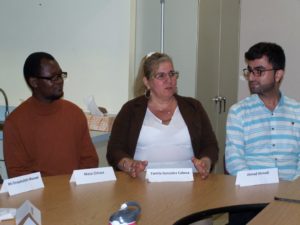
Congratulations to Yamila Gonzalez Cabeza for being selected to receive a laptop at the World Refugee Day Celebration held on June 20, 2019 at OACES on 30 Hart Street. The giveaway was sponsored by the Office of Adult & Career Education Services (OACES) and Digital Literacy as a way to celebrate local refugees’ perseverance and growth as well as foster self-reliance by removing barriers to success through digital literacy. Gonzalez Cabeza also participated on a student panel where she shared her story.
Gonzalez Cabeza is an OACES student at Refugees Helping Refugees where she studies English and works on digital literacy skills.
When asked “What does digital literacy mean to you?” Gonzalez Cabeza responded, “Digital literacy means finding information (for example, the history of the United States) and using the computer or phone. Sometimes this is more convenient and cheaper than buying books. Digital literacy is also important because all people can have access to information if they have the internet and a computer.”
She has learned typing, Microsoft Word, Excel, PowerPoint, email, social media (YouTube, Facebook, Instagram), and how to search on Google.
She says, “These things have helped me a lot because I can learn a lot and have access to all information quickly and easily (for example, weather, bus schedule, Google Maps, etc.). Through email and social media I can connect to more people (including my family) and not be isolated. Computer skills can also help me with my job search (making a resume, email etc.).”
Getting here was not easy. Starting her journey in Cuba, Gonzalez Cabeza had to go through eight different countries, including Brazil and Panama, before arriving in the United States 15 months ago. Passing through the Amazon proved to be a nightmare in and of itself; Gonzalez Cabeza was bitten by fire ants, requiring medical attention before she could continue on.
Currently in the United States without family nearby, Gonzalez Cabeza says having a computer of her own would “help me because I could study and talk to my family anytime, day or night. I wouldn’t have to go to the library or school and spend a lot of time making those trips by bus.”
More than anything Gonzalez Cabeza is grateful for the freedom she has in the United States to study and live. She hopes to be a teacher, assisting others with their English skills one day.
Sharing is caring!
